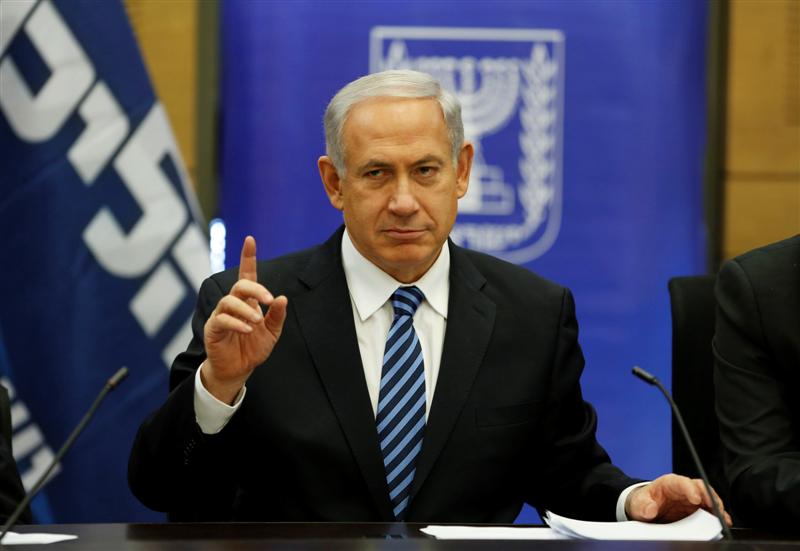Israeli Prime Minister, Benjamin Netanyahu has eulogised “a revolution in Israel’s standing among the nations,’’ underlining that, ‘’as prime minister, I visited six continents in the last year alone.’’
Netanyahu, who addressed the UN General Assembly on Tuesday, covered Israel’s relations with the rest of the world, noting that “So many countries around the world have finally woken up to what Israel can do for them.”
In a report monitored from VOA, he spoke confidently depicting Israel as a global market leader in sectors from agriculture, water purification to counter-terrorism, pointing to the Jewish state’s growing presence in much of Africa and Asia.
Netanyahu also highlighted the visit of Indian Prime Minister Narendra Modi in July, recalling that he had waded into the Mediterranean where they “drank sea water that had been purified only minutes earlier — we imagined the endless possibilities for India, for Israel, and all of humanity.” He said he also visited Egypt.
The Prime Minister, however, devoted much time to a blistering attack on the Iranian regime, pointedly citing similarly strong remarks made by US President Donald Trump from the same podium a few hours earlier.
“Iran vows to destroy my country every day,” Netanyahu told the gathered delegates, quickly turning to his criticism of the Iran nuclear deal of 2015.
“Two years ago, I stood here and explained why the Iranian nuclear deal does not only block Iran’s path to a bomb, but paves its way to a bomb,” Netanyahu said.
The Israeli leader argued that the deal’s fatal flaw is the “sunset clause” governing restrictions on Iran’s nuclear development — echoing his 2015 speech before the UN in which he stated, “what makes matters even worse is that we see a world celebrating this bad deal, rushing to embrace and do business with a regime openly committed to our destruction.”
“In a few years, those restrictions will be automatically removed, not by a change in Iran’s behavior or a lessening of its aggression, they will be removed by a mere change in the calendar,” Netanyahu asserted. “The sunset will cast a dark shadow over the Middle East and the world. Iran will be free to enrich uranium on an industrial scale, placing it on the threshold of a massive arsenal of nuclear weapons.”
Comparing the Iran deal to the ill-fated 1994 agreement between the US and North Korea over Pyongyang’s nuclear programme, Netanyahu summarised Israel’s policy as “change it or cancel it, fix it or nix it.” Fixing the deal, he said, would mean “penalizing Iran for every violation” and, above all, “getting rid of the sunset clause”– an outcome the Iranians are highly unlikely to accept. This was Iran’s riposte to a suggestion from French President Emmanuel Macron that some key provisions of the nuclear deal would need to stay in place after the so-called “Termination Day” in October 2025 — when all remaining EU sanctions are lifted, and Iran will be permitted to resume an ambitious uranium enrichment programme.
Netanyahu berated the “naive” supporters of the deal who believed that Iran would be transformed into a “responsible member of the international community.” The Israeli said that, in contrast, he had warned that Iran would be enabled by the deal to “behave like a hungry tiger unleashed, devouring the nations one after the other.”
Taking a cue from the late British Prime Minister, Winston Churchill’s 1946 speech proclaiming that an “iron curtain” had fallen across the European continent “from Stettin in the Baltic to Trieste in the Adriatic,” Netanyahu stated that “from the Caspian Sea to the Mediterranean, from Tehran to Tartous, an Iranian curtain is descending.” This, he said, was a “curtain of tyranny and terror” that had spread across Iraq, Syria, Lebanon and other countries in the region, but would never succeed in extinguishing “the light of Israel.”
Netanyahu’s message in Hebrew to Iran’s Supreme Leader, Ayatollah Ali Khamenei, “Netzach Yisrael lo yeshaker,” elicited a thunderous applause. He announced — “the Eternal One of Israel does not lie,” a quote from the Biblical prophet Samuel referring to the revival of Israel following periods of destruction. Netanyahu added that although Iran would have “no fiercer enemy than Israel as long as it seeks our destruction,” he declared friendship for Iran’s people. “Shoma duste ma hesteed,” he said in Farsi, “You are our friend…When your day of liberation comes, the friendship between our two ancient peoples will surely flourish once again.”
Specifically, he extolled President Trump’s visit to Israel in May, with Netanyahu telling the US leader that when he placed his hands on the stones of the Western Wall in Jerusalem, he had “touched all of our hearts.”
During a 25-minute speech that was introduced by Israel’s own UN ambassador, Danny Danon, in his new capacity as a vice president of the General Assembly, Netanyahu was assured and even jocular — at one point invoking the penguin population of Antarctica “because I heard that penguins are also enthusiastic supporters of Israel… penguins have no difficulty recognizing that some things are black and white, are right and wrong, and unfortunately, when it comes to UN decision about Israel, that simple recognition is too often absent.”
Netanyahu described Theodore Herzl — the visionary of modern Zionism who convened the First Zionist Congress 120 years ago — as “our modern Moses, and his dream has come true.”
“We’ve returned to the Promised Land, revived our language, gathered our exiles and built a modern, thriving democracy,” the Israeli leader said.

